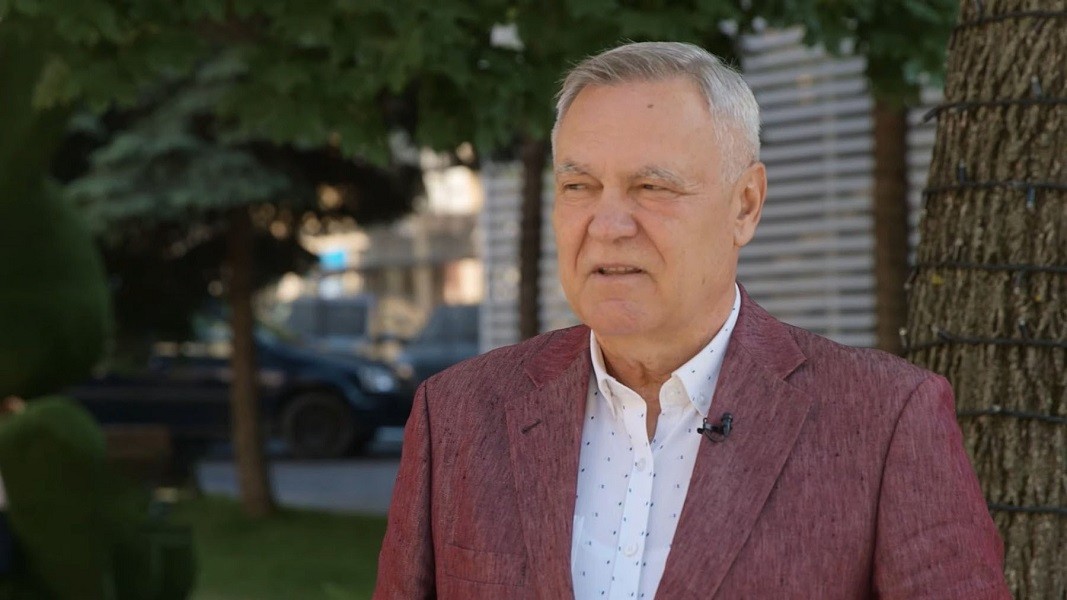If your road takes you to Chisinau, the capital of Moldova, be sure to stop by the Church of St. George the Great Martyr. It will leave a vivid mark in your memories with its charm and the touching story of its construction. Today, as it is the feast of St. George the Victorious, we will explore this church with you. This is the only church in Moldova where services are conducted in Slavonic, the conservative Slavonic liturgical language used by the Eastern Orthodox Church. But that's not the only thing that makes it very special. Georgi Barbarov, chairman of the Bulgarian community in the Republic of Moldova, told Radio Bulgaria's Miglena Ivanova about how St. George's Church was built in the Moldovan capital.
 "In the year 1814 it was decided to build this church. Father Georgi from Chisinau set out to collect money for the construction rom the Bulgarians in Bulgaria (which at the time was under Ottoman rule - ed.) But he was caught by the Turks, who poured melted tin in his mouth and so he died a martyr's death while collecting money for the church. Later the temple was named after him."
"In the year 1814 it was decided to build this church. Father Georgi from Chisinau set out to collect money for the construction rom the Bulgarians in Bulgaria (which at the time was under Ottoman rule - ed.) But he was caught by the Turks, who poured melted tin in his mouth and so he died a martyr's death while collecting money for the church. Later the temple was named after him."
Georgi Barbarov says that he learned this story from Father Nikolai Florinski, the trustee of St. George Church. The priest who initiated the construction of the church, Father Georgi, was a representative of the local Bulgarian community that settled in these lands more than 200 years ago.
The funds for the church were, nevertheless, raised among the Bulgarians both in Bessarabia and in the Bulgarian lands and the temple was built in 1819. More than eight decades later, on November 10, 1940, Moldova was shaken by a devastating earthquake which brought about death and destruction, including to St. George's Church - its central dome was completely destroyed, the bell tower and walls were also damaged.
At the appeal of the church's board of trustees, donations were quickly collected, some of them from the Chisinau municipality, so that St George's was rebuilt.
 Georgi Barbarov explains that this is not the only church where Bulgarians gather in Moldova. In Taraclia, they also have their own temple dedicated to St. George the Victorious. In Chisinau there is a place called "Shipka", where there is also a small church.
Georgi Barbarov explains that this is not the only church where Bulgarians gather in Moldova. In Taraclia, they also have their own temple dedicated to St. George the Victorious. In Chisinau there is a place called "Shipka", where there is also a small church.
"This small church was the place from where the volunteers for the liberation of Bulgaria set out in April 1877. They gathered in Chisinau - Bulgarians from Bessarabia, Russians and Moldovan volunteers from Moldova".
Bulgarians in Moldova traditionally celebrate on May 6 - the Day of St. George the Victorious. Georgi Barbarov tells us what the customs are. "On this day we roast lamb. The custom is that on St. George's Day every family that has a person named George or Georgi celebrates this holiday. They roast a lamb in the oven, stuffed with bulgur, rice or lately with buckwheat, and it is very tasty. We have to say that the holiday is not official, as it is in Bulgaria, but it is just a celebration of the name day of people who go by George."
Photos: georgievskaia.md, Bulgarian Municipality in the Republic of Moldova
English version: Elizabeth Radkova
October 27 marks the 165th anniversary of the birth of Academician Aleksandar Teodorov-Balan, who was the first theorist of the Bulgarian literary language, phonetics and grammar. He was born was born in 1859 in the village of Kubey, Bessarabia...
Over 150 exhibits from 14 Bulgarian museums will take part in an exhibition entitled "Ancient Thrace and the Classical World" . The exposition will be opened on November 3 at t he Getty Museum in Los Angeles and will continue until March 3, 2025...
On October 26, the Bulgarian Orthodox Church marks the Day of Great Martyr St. Demetrius of Thessaloniki, considered one of the greatest saints. In Bulgaria, his name is also associated with the restoration of the Second Bulgarian..
On November 22 and 23, the Bulgarian Orthodox Church will solemnly celebrate the 100th anniversary of the consecration of the Patriarchal Cathedral "St...
The Patriarchal Cathedral of St Alexander Nevsky is celebrating its temple feast today. The cathedral, a symbol of the Bulgarian capital, was built "in..

+359 2 9336 661
